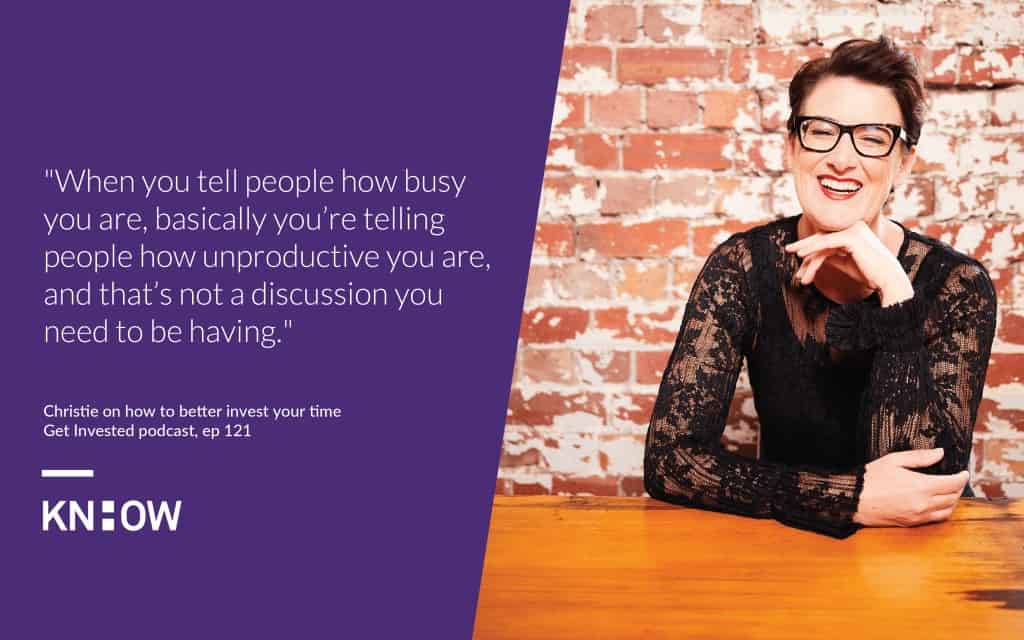Inconsistent values, an overly busy lifestyle and a multitasking work style all chew up a huge amount of our time, says ‘time styler’ Kate Christie.
Kate Christie is a time investment expert and best-selling author who works with businesses, entrepreneurs, C-suite executives, educators and government agencies to improve their productivity and time management.
She told KnowHow founder Bushy Martin on the Get Invested podcast that the first area which can impact your time management is inconsistent values.
“You have to spend your day doing the things that are most important to you … and having authentic conversations to be true to those values,” Kate said.
“Values do change depending on your circumstances, but constantly revisit them or just tune them to make sure that they’re consistent with the way you currently live.
“If you’re not living in a way that’s consistent with those core values, then you’re going to be really unhappy. And it’s either because what you’re doing is inconsistent with what you think your values are, or your values need to be realigned and your values might not actually be quite right.
“By having absolute clarity over that, it makes it really easy for me to say no to everything else because that’s just white noise. So I don’t have to have that debate with myself – ‘Will I or won’t I? Should I or shouldn’t I? Can I or can’t I?’ It’s just a simple ‘no’.
“It’s about integrating life. It’s about making sure that you’re making time and investing your time in order or things that are most important to you.”
Kate also revealed the consequences of having an overly busy lifestyle, which we should try to avoid at all costs. She explained that by having the right headspace and finding the time to think about your life situation, you will be able to redefine your time.
“In opting out of my career and realising that time was an issue for me, I then spent time kind of redefining my own time and thinking how could I be doing things differently,” she said.
“[A busy lifestyle] results in burnout. It results in fatigue. It certainly results in a lot of unhappiness. And then you get all that other stuff like the imposter syndrome and the guilt and the judgement because you’re just working at too fast a pace.
“When you tell people how busy you are, basically, you’re telling them how unproductive you are. And that’s not a discussion you need to be having.
“So now, with everything that’s happening with COVID-19 and lockdowns, now is the perfect time to reframe your time and stop thinking about these busy lifestyles we lead.”
With a busy lifestyle comes the need to multitask, and Kate hit the hard truth – that the majority of people cannot effectively (or efficiently) multitask.
“When we try to multitask, which can be as simple as having your screen on with your emails flashing in the top right-hand corner all day … our productivity goes down by 40%,” she said.
“So if you’re doing that all day, every day and having those sorts of behaviours all day, every day, then at best you’re only ever working to 60 percent of your productivity or your capacity.
“There’s also re-calibration time … as professionals working in an office type environment, we’re interrupted around every eight minutes, all day, every day. Each time you’re interrupted, it takes you up to 23 minutes to return to the thing you were focused on at the point of interruption, because often we’ll take on two different tasks before we return to an original task.”
To avoid falling into the trap of multi-tasking, Kate advises that everyone should be creating a well thought out to-do list which identifies the two most important tasks you have to do each day and the period of time when ‘you know you’re going to be in the zone’.
She says that by focusing on two important tasks, as opposed to three or more, it ensures they’re both completed during periods when you have high energy.
“It’s very hard to do three key high value tasks in a day because there’s going to be part of one of those tasks that will potentially suffer for want of energy, enthusiasm, endeavour or creativity,” Kate said.
“So if you’re a morning person, batch your morning with your highly valuable, high performing tasks, the strategic tasks. Then batch out your afternoon with your process driven type work because you’re more likely to be tired and sluggish.
“[Also] batch in time that you’re going to go and put the dishwasher on … or when you’re going to have lunch. It’s just the concept of locking out chunks of time in your calendar to complete things in one go.
“The other thing you need to do is build in some breaks so that when you’re working from home and in the office, you know, you want to get up and have sort of 10 to fifteen minute breaks between each 45 minute to hour bursts, because your day is a series of short sprints, not a marathon.”
Listen to the full interview here.
Want to Know How you can build wealth with the help of leading, qualified experts? Talk to the team at KnowHow, now.




